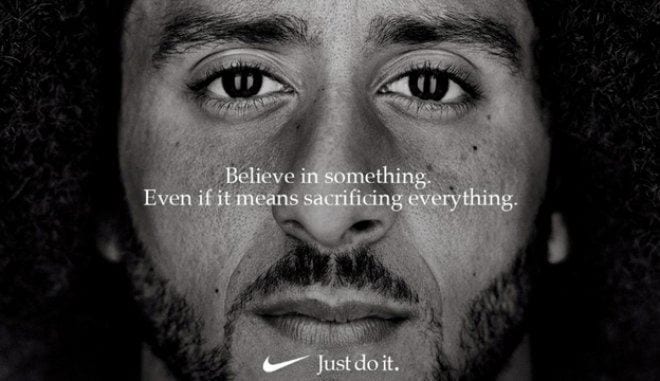By Claudia Russell
Was Nike’s advertising campaign featuring exiled football player Colin Kaepernick a statement of political principle or a cynical marketing ploy? Claudia Russell investigates.
Earlier this month, the sportswear brand Nike caused an uproar with a new ad campaign featuring Colin Kaepernick, a former NFL football player who knelt during the pre-game national anthem in August 2016 – a silent protest against police brutality towards unarmed African-American men.
His actions divided the country. US President Donald Trump and his supporters accusing the athlete of disrespecting the American flag and military. The protest is widely thought to have cost Kaepernick his career in football. The athlete filed a grievance claim against the NFL in 2017, accusing them of colluding to not hire him. Nike’s marketing slogan ‘Believe in something, even if it means sacrificing everything’, set against a photograph of Kaepernick, shows that Nike stands firmly behind the player and his cause.
Controversy spread rapidly. The hashtag #boycottnike sprung up in retaliation, with conservative Twitter users burning their Nike shoes and cutting the distinctive ‘swoosh’ from their clothing. Many were vocal with their decision to swear off the brand, with Mississippi State Police going so far as to ban the purchase of Nike products within the agency. By some measures, the ad has tarnished Nike’s brand. However, the sporting goods giant appeared unphased by the risk of losing conservative customers. The phrase ‘any publicity is good publicity’ springs to mind when looking at the overall effect of the marketing campaign.
The risk, it seems, was one worth taking: Nike shares closed at an all-time high for six days straight following the release of the campaign.
While some may view the campaign as a selfless risk taken in the name of justice, the reality is likely more calculated. Nike have a high-powered marketing team who almost certainly anticipated the ‘fallout’ from supporting such a controversial figure. Angering conservative consumers was at least expected, if not planned. Cynics argue that the advertising campaign is nothing more than a shallow ploy to hijack social movements in order to sell shoes. Nike’s key consumers are young, urban consumers – the same people who are by and large likely to support diversity and social justice.
Macquarie University sports professor Keith Rathbone argues: “young people are said to strongly support the Kaepernick protest, and they are the biggest consumers of Nike products. Nike also knows that consumers develop brand loyalty early in their lives and maintain it for a long time.” Indeed, a number of studies support the thesis that socially responsible firms are likely to deliver superior financial performance.
The brand joins a host of companies following progressive political causes. Corporate social responsibility (CSR ) or ‘woke’ advertising is nothing new, however economists note it has risen almost astronomically in the Trump era, with 90 percent of Global Fortune 250 companies now publishing annual CSR reports. One example is the ill-fated Pepsi commercial featuring model Kendall Jenner, featured putting an end to racial injustice by giving a police officer a can of Pepsi. The ad was ridiculed by many, including none other than Bernice King, daughter of Dr Martin Luther King, who tweeted: “If only Daddy would have known about the power of Pepsi.”
Business experts warn against falling victim to the ‘halo effect,’ which risks giving the company a better public image while it continues to follow dangerous business practices that harm people and the planet. It wasn’t long ago that Nike was dealing with the backlash over its use of sweatshops and child labour. One study by the team at Freakonomics Radio found that Corporate Social Responsibility programs attract better job applicants who are willing to work for less money. Companies who follow CSR programs are also more likely to receive lenient sentences when tried in court under corruption charges. Consumers should be wary of companies that hijack social justice movements and equate buying products to fighting for human rights.
On the other side of the coin: Kaepernick’s message is a deeply important one. Arguably this kind of publicity is a way to promote conversation around the issue of police brutality against African-Americans.
If Nike profits from this, does it really matter? That question is far more difficult to answer.
Claudia Russell is an International Relations and Political Studies student at the University of Auckland.
Disclaimer: The ideas expressed in this article reflect the author’s views and not necessarily the views of The Big Q.

